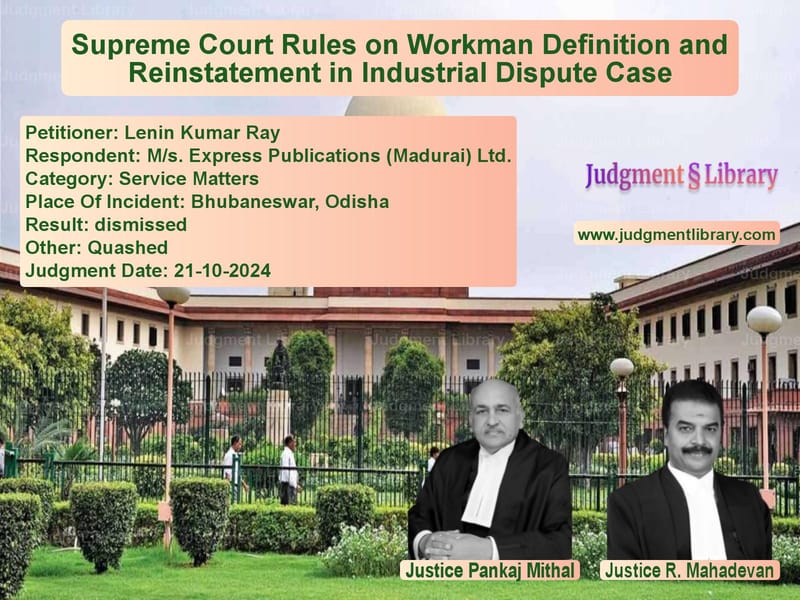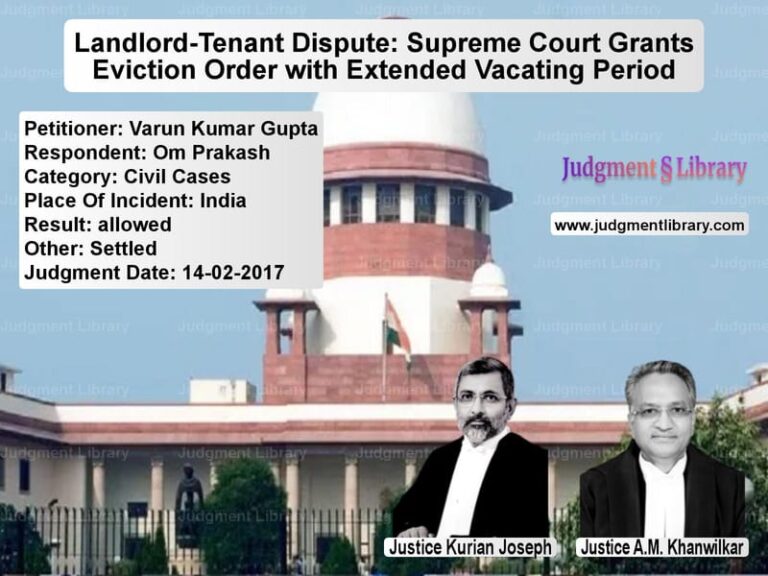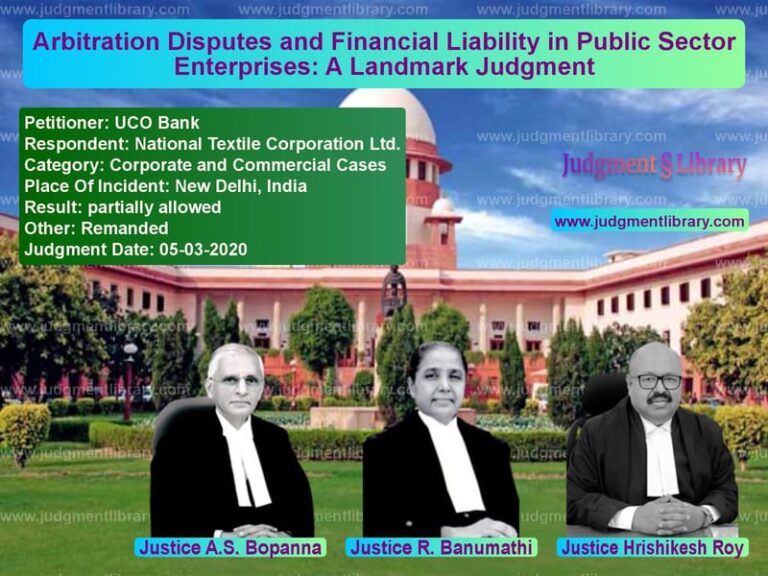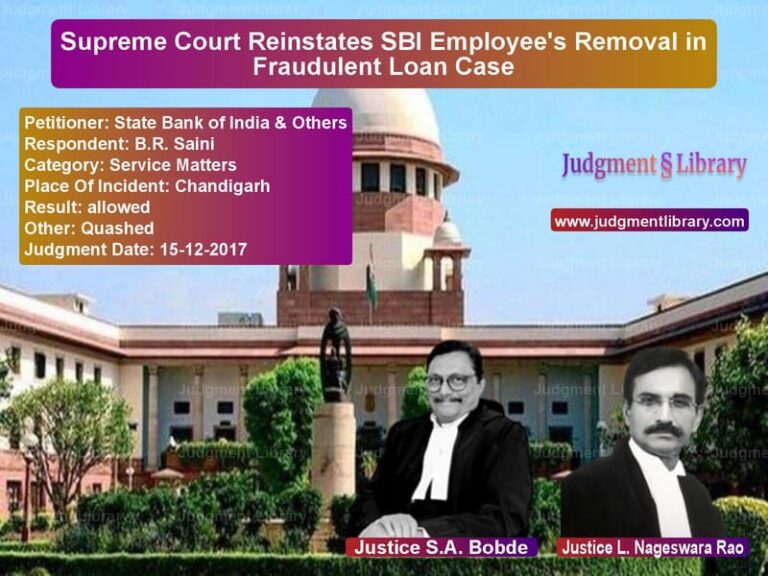Supreme Court Rules on Workman Definition and Reinstatement in Industrial Dispute Case
The Supreme Court of India, in Lenin Kumar Ray v. M/s. Express Publications (Madurai) Ltd., delivered a significant judgment on October 21, 2024, addressing the issue of whether an employee falls under the definition of a ‘workman’ under the Industrial Disputes Act, 1947, and whether reinstatement was justified. The Court ruled that the employee was not a ‘workman’ as per Section 2(s) of the Act and upheld the High Court’s decision to deny reinstatement while setting aside the finding of the Labour Court that categorized the employee as a ‘workman.’
Background of the Case
The dispute arose between Lenin Kumar Ray (the employee) and M/s. Express Publications (Madurai) Ltd. (the employer), which publishes the New Indian Express. The employee had joined the company as a Junior Engineer (Electronics & Communication) on June 7, 1997, and was later promoted to Assistant Engineer. However, his services were terminated on October 8, 2003, with the employer providing one month’s salary in lieu of notice.
Legal Proceedings
- The employee challenged the termination before the Labour Court, Bhubaneswar, which ruled that he was a ‘workman’ under Section 2(s) and ordered his reinstatement with compensation of ₹75,000 in lieu of back wages.
- The employer challenged this decision before the Orissa High Court, which set aside the reinstatement order while upholding the Labour Court’s ruling that the employee was a ‘workman.’
- Both parties appealed to the Supreme Court, leading to this judgment.
Petitioner’s Arguments (Lenin Kumar Ray)
The employee contended:
- He performed technical duties and was not in a managerial or supervisory role.
- The employer’s decision to terminate him was arbitrary and violated principles of natural justice.
- He was not given any prior notice or opportunity to defend himself before termination.
- The Labour Court’s order of reinstatement was justified, and the High Court erred in modifying it.
Respondent’s Arguments (Express Publications)
The employer countered:
- The employee was in a supervisory capacity and hence did not qualify as a ‘workman’ under Section 2(s) of the Industrial Disputes Act.
- At the time of termination, the employee’s salary exceeded the prescribed limit for a workman under the Act.
- Clause 14 of the appointment letter allowed termination with one month’s notice or salary, which was duly provided.
- The High Court rightly set aside reinstatement as the employee was no longer part of the organization and monetary compensation was sufficient.
Supreme Court’s Analysis and Judgment
Definition of ‘Workman’
The Supreme Court reviewed the scope of Section 2(s) of the Industrial Disputes Act, which defines a ‘workman’ as:
“Any person employed in an industry to do any manual, unskilled, skilled, technical, operational, clerical, or supervisory work for hire or reward but does not include a person employed in a managerial or administrative capacity.”
The Court ruled:
“The nature of the employee’s duties indicated a supervisory role, as he oversaw the work of junior engineers. Thus, he does not qualify as a ‘workman’ under Section 2(s).”
Termination Was Lawful
The Court held that:
“Clause 14 of the appointment letter allowed termination with one month’s salary, which was duly provided. The employee also accepted and encashed the cheque, indicating acquiescence.”
No Reinstatement, Compensation Sufficient
The Court rejected the demand for reinstatement:
“Reinstatement with full back wages is not the normal rule in cases where an employee has been terminated lawfully with compensation.”
Key Takeaways from the Judgment
- Scope of Workman Definition: Employees with supervisory roles do not qualify as ‘workmen’ under the Industrial Disputes Act.
- Termination with Notice Salary is Lawful: Employers can terminate employees as per contract terms without violating labor laws.
- Limited Scope of Reinstatement: Compensation is preferable in cases of lawful termination rather than forcing reinstatement.
Impact of the Judgment
- Clarifies Definition of Workman: Provides a legal framework for determining workman status in industrial disputes.
- Protects Employer Rights: Reinforces that lawful termination with compensation is permissible.
- Sets Precedent for Labor Law Cases: Guides future disputes regarding termination and reinstatement under the Industrial Disputes Act.
Conclusion
The Supreme Court’s judgment in Lenin Kumar Ray v. Express Publications sets an important precedent in labor law. By holding that the employee was not a ‘workman’ and denying reinstatement, the Court has reinforced the principle that termination with compensation is legally valid. This ruling will provide clarity in industrial disputes and ensure that employers and employees adhere to contractual terms in termination cases.
Petitioner Name: Lenin Kumar Ray.Respondent Name: M/s. Express Publications (Madurai) Ltd..Judgment By: Justice Pankaj Mithal, Justice R. Mahadevan.Place Of Incident: Bhubaneswar, Odisha.Judgment Date: 21-10-2024.
Don’t miss out on the full details! Download the complete judgment in PDF format below and gain valuable insights instantly!
Download Judgment: lenin-kumar-ray-vs-ms.-express-publica-supreme-court-of-india-judgment-dated-21-10-2024.pdf
Directly Download Judgment: Directly download this Judgment
See all petitions in Employment Disputes
See all petitions in Termination Cases
See all petitions in Disciplinary Proceedings
See all petitions in Public Sector Employees
See all petitions in Workplace Harassment
See all petitions in Judgment by Pankaj Mithal
See all petitions in Judgment by R. Mahadevan
See all petitions in dismissed
See all petitions in Quashed
See all petitions in supreme court of India judgments October 2024
See all petitions in 2024 judgments
See all posts in Service Matters Category
See all allowed petitions in Service Matters Category
See all Dismissed petitions in Service Matters Category
See all partially allowed petitions in Service Matters Category







